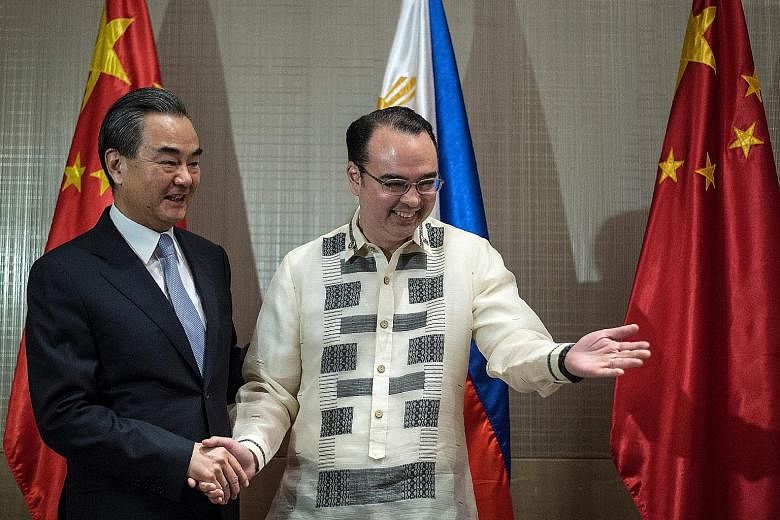China is open to exploring jointly with the Philippines for oil and gas in the disputed waters of the South China Sea, even as it urges South-east Asian nations to "say no" to "non-regional forces" seeking to "stir up trouble" in the region.
"In waters where there is overlapping of maritime rights and interests, if one party goes for unilateral development, then the other party will take the same actions, and that might complicate the situation at sea. That might lead to tensions," Chinese Foreign Minister Wang Yi said at a news conference yesterday.
Mr Wang, who is in Manila for a two-day visit, said joint development of natural resources in disputed waters "is full of political wisdom". He made the remarks a day after President Rodrigo Duterte said a partner had been found to develop oil and gas fields inside the Philippines' exclusive economic zone.
"There is a partner. I just can't say. They are talking, and they are exploring," Mr Duterte told reporters, without providing details.
Philippine energy officials said earlier drilling at Reed Bank, which was suspended in 2015, might resume before the year end, and that the government was preparing to offer new blocks to investors in an auction in December.
Reed Bank, about 140km north- west of Palawan province, is thought to have gas reserves of as much as 20 trillion cubic feet. The Philippines had been looking to develop it to replace the Malampaya gas field, which is expected to be depleted by 2030.
In 2004, energy companies in the Philippines, China and Vietnam signed a "joint maritime seismic undertaking" that included Reed Bank. But that arrangement was hobbled by opposition in the Philippines, legal challenges and corruption allegations against then President Gloria Arroyo. It lapsed in 2008, and relations between the Philippines and China deteriorated.
Territorial disputes hampered Manila's plan to drill two appraisal wells at Reed Bank. In 2011, Chinese patrol vessels almost rammed into a Philippine-contracted survey ship there. A year later, a Philippine petroleum company approached China's CNOOC about a possible joint development. But CNOOC declined, as a deal would have meant recognising Philippine sovereignty.
In 2013, citing China's harassment of the survey ship as one reason, the Philippines filed an arbitration case to challenge China's claims to nearly all of the South China Sea. Last year, the arbitration tribunal dismissed China's claims and upheld the Philippines' rights to its exclusive economic zone, which included Reed Bank. Mr Duterte, however, set aside the ruling, as he opted instead to pursue warmer ties with China.
Mr Wang, meanwhile, urged nations in South-east Asia to take the lead from closer ties between China and the Philippines and reject outside forces seeking to interfere in the South China Sea dispute, in an apparent swipe at the United States ahead of a regional summit.
"If there are still non-regional forces in the region, they don't want to see stability… and they still want to stir up trouble in the South China Sea, we need to stand together and say no to them together," he said.

